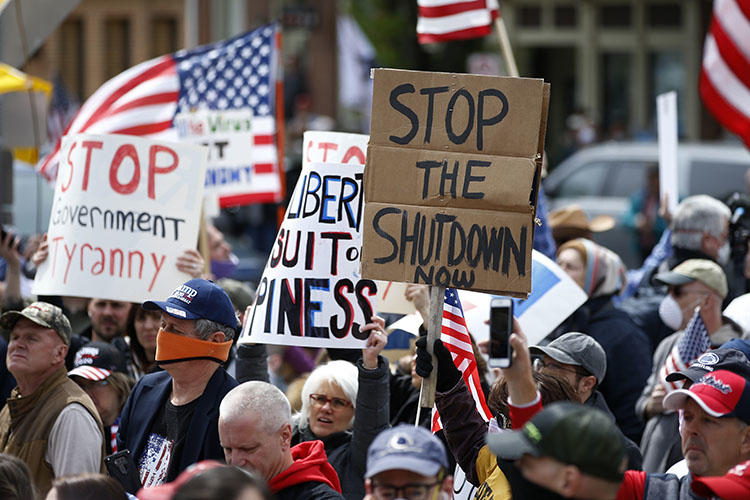Short-term benefits not worth reopening economy

With two paths out of the coronavirus pandemic, — keep Florida on lockdown and risk a recession or reopen and risk public health — Gov. Ron DeSantis began to reopen Florida in phases on May 4.
Regardless of when states reopen, it’s likely that the global economy will face a recession worse than the Great Depression of the 1930s, according to the International Monetary Fund’s Chief Economist Gita Gopinath.
It may seem that the best solution to stop the economy from bleeding out is to reopen the country and resume business as soon as possible. Vocal anti-lockdown protestors have rallied in at least 10 states, according to The Hill. Even President Donald Trump voiced his opinion on lockdown when he retweeted an interview with angry anti-lockdown protestors regarding lost wages and business from My Fox Boston on Tuesday.
Unfortunately, this solution provides only short-term benefits and harms the country in the long run.
The Economic Policy Institute predicted in March that by summer, almost three million jobs would be wiped out from the U.S. economy. By May, though, CNN reported that over 20 million American jobs were lost in April alone.
The recession will hurt not only business owners and working adults but also young college graduates entering into a broken economy. In a survey of 822 students conducted from April 10-12, a College Reaction/Axios poll found that 38 percent of students who said they had secured an internship or postgraduate work now reported that those opportunities were canceled.
Reopening the country and resuming normal work with “safer measures” may help the economy regain some of what it has lost in the past few months, but we are not ready for the risk that comes with it.
People may return to the workforce and unknowingly spread the virus if they aren’t given proper protective gear. Approximately 40-45 percent of people infected with COVID-19 may be asymptomatic, according to a Feb. 13 research paper in the International Journal of Infectious Diseases. This means that some people may take less precautions and not wear masks and gloves because they don’t know they’re carrying the virus.
By taking this risk, we also expose ourselves to something even more devastating than one recession. Popular American immunologist, Dr. Anthony Fauci, told Forbes in April that if we lift state lockdowns and the general population is not properly monitored, we could face a second wave of COVID-19 in the fall, possibly leading to a second economic shutdown.
Another lockdown means more deaths, more businesses being forced to shut down and trillions in more coronavirus relief aid to businesses and individuals that could further tank the economy.
LPL Financial, the largest independent financial advising company in the U.S., predicted that Standard & Poor’s 500 index (S&P 500), a market index that tracks stocks of 500 top U.S. companies, may manage to recover 12 percent by the end of the year with the current situation.
If a second wave does occur, it’s expected to lose an additional 23 percent. This means that even though we may get a slight short-term economic advantage from reopening, we risk a 35 percent decrease in stock percentage. This means more unemployment, more bankrupt small businesses and a devastating situation.
Clearly, the U.S. won’t be able to financially handle a second wave, which some experts have said could be potentially worse than the first one.
“There’s a possibility that the assault of the virus on our nation next winter will actually be even more difficult than the one we just went through,” the Centers for Disease Control and Prevention Director Robert Redfield said.
Reopening the country may seem like the best decision that can save our economy at the moment, but waiting for the pandemic to be over, even with such great losses, maybe the actual best option we have now so we can avoid a second wave and save lives.
Mohamed Abdelmagaid is a junior studying political science and integrated public relations and advertising.







